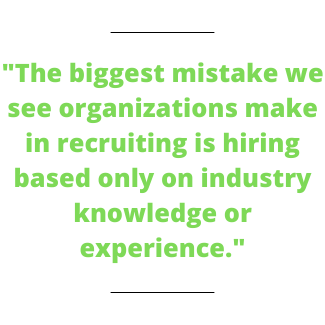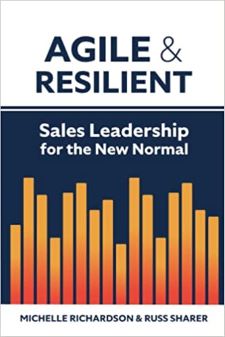Recruiting For Sales? Don’t Make These Common Mistakes

Any company can and should put pride into their product or service. And sometimes quality alone can lead to a sale. But products can’t control who is selling them, and in the hands of the wrong sales team, a great product might not land the buyers it should.
But all of that comes down to starting points: hiring the right sales team and providing them with the right sales training. According to a new book, Agile and Resilient: Sales Leadership For the New Normal by Michelle Richardson and Russ Sharer of The Brooks Group, a sales training company and consultancy, these are steps you simply can’t skip, no matter the size or stage of your company. The new book focuses on how the past few years have changed the way selling operates going forward.
PPAI Media spoke to Richardson, The Brooks Group’s vice president for sales performance research, and Sharer, director of strategic sales excellence, about some of the most common mistakes companies make when recruiting new sales members and why training is important.
What’s the biggest recruiting mistake?
According to Sharer and Richardson, there isn’t some small thing that a lot of companies are overlooking. Many of them actually have a fundamental flaw in what they are looking for.
“The biggest mistake we see organizations make in recruiting is hiring based only on industry knowledge or experience,” Sharer says.
Plenty of companies, looking for those qualities, try to hire from competitors. In their minds, this will reduce onboarding time.

“Instead, this approach results in a lot of recycling of mediocre sellers,” Richardson says.
There’s no need to put too high a price on industry knowledge. It’s teachable to candidate with the right selling skills and fit with the organization. Does the candidate see the vision that you see for the company? Can they articulate that? Those are the kind of things that are important. Even industry experience is overrated in terms of recruiting a sales team. Don’t be afraid to look beyond the industry.
“We’ve seen that this actually makes for a broader and richer hiring pool, which is so important in today’s tight labor market,” Richardson says.
Are there ways that experience can actually be a hindrance to sellers?
Maybe you manage to hire a veteran in the industry with so much experience, the whole rest of your team could learn a thing or two from them. That’s great, but that doesn’t mean they don’t still need sales training themselves upon joining your company.
“The analogy that we use is that, despite his skill and track record,[NFL quarterback] Tom Brady still goes to pre-season practice,” Sharer says.

Sharer and Richardson break down training into two components: product training and industry knowledge. Industry knowledge can be tailored (potentially shortened) depending on the experience of the new hire. But product training is a “must” for any new seller, “unless they move into a sales role from elsewhere in the organization” and already have a great deal of familiarity with the product.
Richardson also stresses that selling skills should be analyzed, no matter the new seller’s experience or pedigree because experienced sellers can pick up bad habits that might have been easier to get away with when selling a previous product.
“The selling skills assessment can be done via a formal ‘hard skills’ sales assessment, as well as through pipeline reviews and field observations,” Richardson says.
When building a sales team, how important is diversity of skill?
Richardson and Sharer have provided consulting for a lot of companies, and often, one of the reasons those companies have found themselves in a rut is because the people in charge of hiring are looking for sellers who “remind them of themselves.”
It makes sense. Most sales leaders used to be in sales, so, in theory, they have good sales judgement.
“This results in a sales team with similar strengths and common flaws,” Sharer says. It also might fail to factor in how the organization or industry has changed over time.
“Instead, leaders should objectively consider what is essential for sales success at their company moving forward–that is, what behavioral characteristics, motivators, and ‘soft skills’ are most important,” Richardson says.

